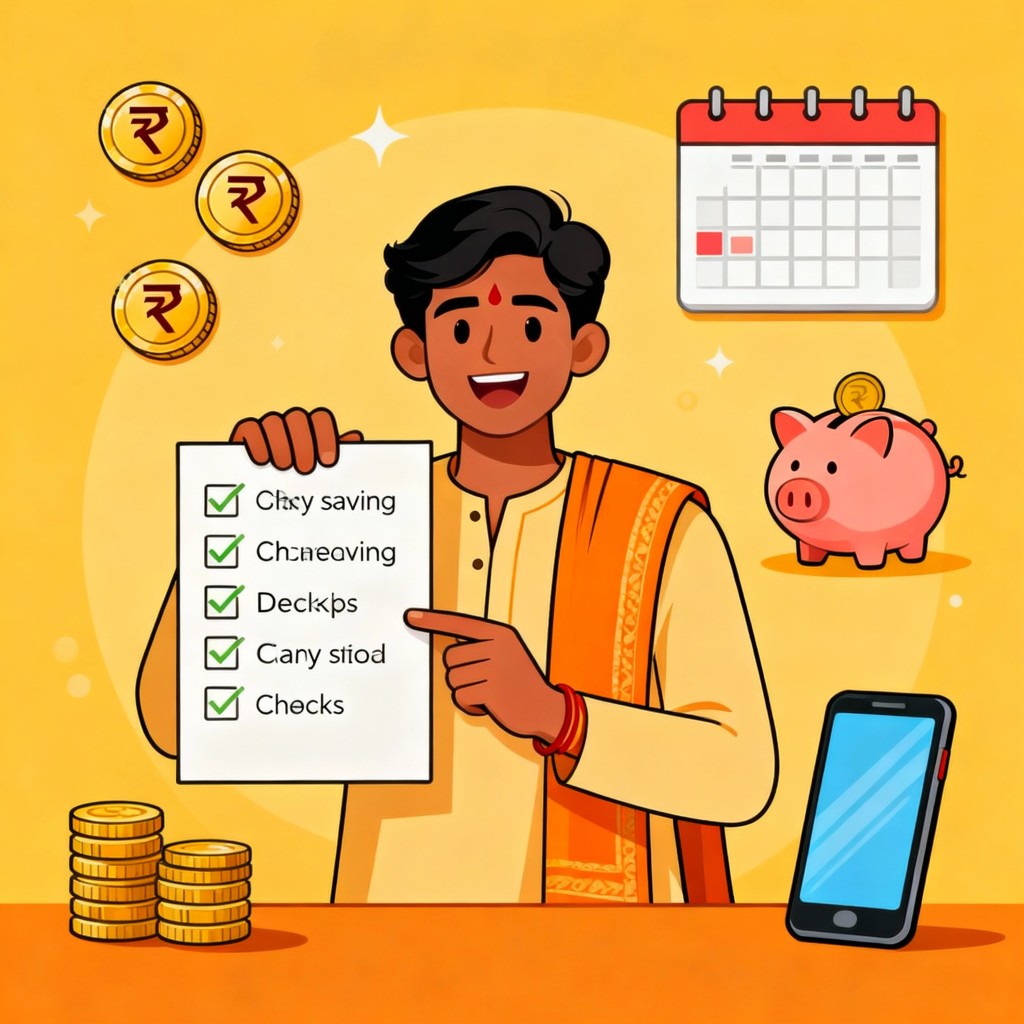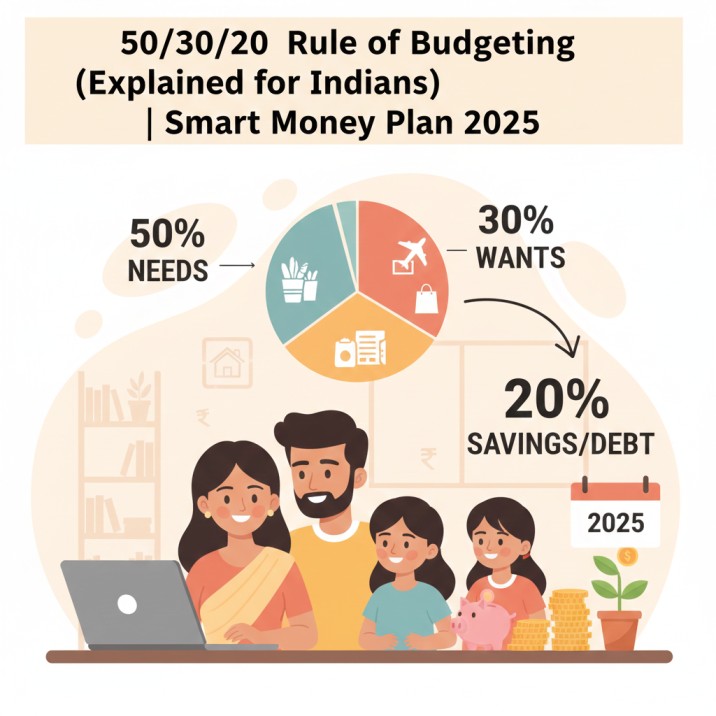Discover 15 practical money-saving tips that help you save ₹10,000 every month in 2025 and 2026. Learn simple, daily changes for food, bills, shopping, and habits — from SaveWithRupee.com.

15 Daily Money Tips to Save ₹10,000 in India (2025 & 2026) – Smart, Practical Habits
Most Indians believe saving ₹10,000 a month needs:
- A higher salary
- Side income
- Extreme sacrifices
That’s not true.
In reality, ₹10,000 leaks out quietly every month through small, daily habits — food orders, unused subscriptions, impulse buys, careless bill payments, and “it’s just ₹100” thinking.
In 2025 and 2026, smart money management is not about cutting happiness.
It’s about building daily habits that protect your money automatically.
These 15 tips are not theory. They are practical habits used by real Indian families, students, and salaried professionals.
Why Daily Habits Matter More Than Big Decisions
You don’t overspend once a month.
You overspend every day in small amounts.
Saving ₹10,000 monthly doesn’t need dramatic changes.
It needs 15 small daily decisions done consistently.
Let’s get into them.
1. Track Every Rupee for Just 5 Minutes Daily
Most people don’t know where their money goes.
Spend 5 minutes every night:
- Note expenses
- Categorise quickly
- No judgement, just awareness
This single habit can reduce overspending by 20–30%.
Many Indians realise this only after trying it once, as explained in how I track every rupee I spend.
2. Carry a Fixed Daily Spending Limit
Decide a simple number:
- ₹300
- ₹500
- ₹800
Withdraw or mentally lock that amount for daily variable spending.
When money is limited, choices improve automatically.
3. Eat One Home-Cooked Meal Extra Every Day
Replacing just one outside meal:
- Saves ₹100–₹200 daily
- ₹3,000–₹6,000 monthly
No diet changes.
No extreme rules.
Just one extra home meal.
4. Stop Random Online Orders “Just Because”
Most online shopping isn’t planned.
Before buying:
- Wait 24 hours
- Ask: “Will I remember this purchase next month?”
Impulse delay alone saves thousands.
5. Turn Cashback into a Habit, Not a Chase
Pay bills, recharges, and shopping through cashback platforms.
Don’t chase offers.
Just don’t miss free money.
Used correctly, cashback feels like hidden income over time, as shown in 15 daily money hacks to save ₹10,000 this year.
6. Check Your Bank Balance Once a Day
This sounds boring — but it works.
People who check balances daily:
- Spend less impulsively
- Think twice before swiping
Awareness creates control.
7. Use a “No-Spend” Rule for One Category
Choose one category:
- Coffee
- Snacks
- Online shopping
- Cabs
No spending there for weekdays.
You don’t feel deprived, but savings quietly grow.
8. Cancel One Unused Subscription This Week
OTT, apps, cloud storage — many run unused.
Cancel just one:
- ₹199–₹499 saved instantly
- No lifestyle impact
Do this once a month.
9. Withdraw Cash Once, Not Daily
Multiple ATM withdrawals:
- Increase spending
- Increase bank charges
Withdraw once or twice a month.
Cash discipline saves silently.
10. Avoid “Convenience Fees” Actively
₹10 here. ₹20 there. ₹50 convenience fee.
These fees feel small but add up to ₹500–₹1,000 monthly.
Use UPI, bank transfers, or fee-free methods wherever possible.
11. Shop with a List — Even Online
Shopping without a list = overspending.
Whether groceries or clothes:
- Make a short list
- Buy only that
This habit alone can cut 20% grocery cost, as explained in grocery shopping tips to cut monthly expenses.
12. Keep a ₹100 Daily Saving Challenge
Every day:
- Save ₹50–₹100 separately
- No excuses
₹100 × 30 days = ₹3,000
₹50 × 30 days = ₹1,500
Small, consistent, powerful.
13. Switch Off Auto-Pilot Spending
Auto-debits feel invisible.
Review:
- Auto renewals
- EMI dates
- Subscriptions
Keep only what’s necessary.
14. Avoid “Sale Mentality”
A discount doesn’t mean saving.
If you weren’t planning to buy it:
- It’s not a saving
- It’s an expense
This mindset shift alone changes everything.
15. Review Your Day’s Spending Before Sleeping
Ask two questions:
- Where did I spend unnecessarily?
- What can I improve tomorrow?
No guilt.
Just learning.
Over time, your brain rewires spending behaviour.
How These Habits Add Up to ₹10,000
Let’s do realistic math:
- One home-cooked meal: ₹4,000
- Reduced impulse shopping: ₹2,000
- Cashback & fees avoided: ₹1,500
- Subscription & small cuts: ₹1,500
- Daily saving habit: ₹1,000
👉 Total: ₹10,000 saved monthly
No extra income.
No sacrifice.
Just smarter habits.
Why Most People Fail to Save (Even After Reading Tips)
They try everything at once.
Don’t.
Pick 3 habits this week.
Add more slowly.
If your income is tight, this guide on how to save money on a small salary gives realistic structure.
FAQs
1. Can I really save ₹10,000 without earning more?
Yes. Most households already leak this amount unknowingly.
2. How long before these habits feel natural?
Around 30–45 days with consistency.
3. Do these tips work for students and families?
Yes. They work best for people with fixed or limited income.
4. Should I stop enjoying life to save?
No. Smart saving improves enjoyment by reducing stress.
5. What if I miss a day?
No problem. Consistency matters more than perfection.
Final Thoughts
In 2025 and 2026, money problems won’t be solved by motivation quotes or extreme budgeting.
They’ll be solved by:
- Awareness
- Small daily discipline
- Honest self-review
Saving ₹10,000 a month is not about being strict.
It’s about being intentional.
🔗 Related Reads on SaveWithRupee.com
- 10 Small Lifestyle Changes That Save Big Money
- Weekly Budget vs. Monthly Budget – Which Works Better
- How to Save Money on School Tuition Fees
- Best Online Shopping Tricks to Save Money
- How to Save ₹5000 Every Month Without Sacrifice
Explore more practical guides on SaveWithRupee.com:
- How to Save Your First ₹1 Lakh Step-by-Step
- How to Build Wealth Slowly in India
- Emergency Fund: How Much Should an Indian Household Keep?
💚 SaveWithRupee.com – Helping Every Indian Family Save Smart, Live Better.
Disclaimer: This article is based on personal experience and is for educational purposes only. It does not constitute financial, investment, or legal advice. Readers are advised to do their own research or consult a qualified professional before making any financial decisions.


